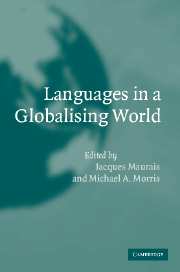Book contents
- Frontmatter
- Contents
- List of figures
- List of tables
- Notes on contributors
- Acknowledgements
- 1 Introduction
- Part I Global communication challenges
- Part II Major areas
- Part III Languages of wider communication
- 15 The international standing of the German language
- 16 Arabic and the new technologies
- 17 Russian in the modern world
- 18 Geolinguistics, geopolitics, geostrategy: The case of French
- 19 Towards a scientific geostrategy for English
- 20 On Brazilian Portuguese in Latin American integration
- Conclusion
- Index
19 - Towards a scientific geostrategy for English
Published online by Cambridge University Press: 18 November 2009
- Frontmatter
- Contents
- List of figures
- List of tables
- Notes on contributors
- Acknowledgements
- 1 Introduction
- Part I Global communication challenges
- Part II Major areas
- Part III Languages of wider communication
- 15 The international standing of the German language
- 16 Arabic and the new technologies
- 17 Russian in the modern world
- 18 Geolinguistics, geopolitics, geostrategy: The case of French
- 19 Towards a scientific geostrategy for English
- 20 On Brazilian Portuguese in Latin American integration
- Conclusion
- Index
Summary
Geostrategy via a future language observatory
Given the dearth of substantive language data, including ‘language interpretable and language-relatable figures’ (Kloss and McConnell 1974–98, vol. 1, pp. 23–25), it would seem somewhat presumptuous to discuss the future ‘geostrategy’ of languages, and especially those languages that are found on most continents and in a large number of countries. It seems doubly presumptuous to discuss in a few short pages the future of English, it being manifestly the most widespread and complex network of any language in the world. ‘Geostrategy’ is here defined in terms of an empirical research model, that should allow for a widespread monitoring and analysing of changes in the numbers of language users and language uses. Although most of my comments apply to English, the model could also be applied to what have been called the ‘big’ languages, or even to all the languages of the world. The editors of this volume have wisely advised against ‘long-term projections and predictions’, but have rather recommended including ‘factors of equilibrium and disequilibrium among “big” languages at the start of the twenty-first century’.
The problem here is that few of the ‘big’ languages have a centralised international agency to collate, analyse, monitor, evaluate, generate and distribute normative macro data on a global scale. It is true that institutes such as the British Council do promote the teaching of English and tend to its worldwide visibility on the cultural plane.
- Type
- Chapter
- Information
- Languages in a Globalising World , pp. 298 - 312Publisher: Cambridge University PressPrint publication year: 2003
- 4
- Cited by



